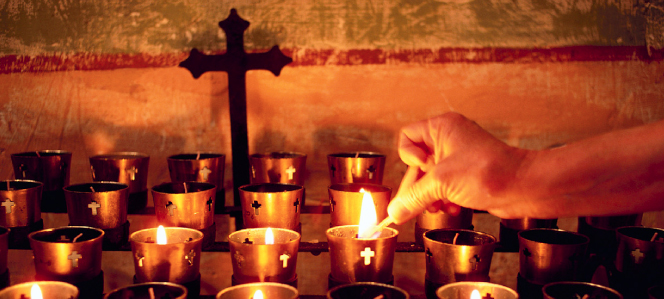The Feast of All Souls, or the Commemoration of the Faithful Departed, is the day on which Masses offered are intended for the benefit of the dead. This particular practice seems to have originated with the monasteries associated with the Cluniac Reform and quickly gained momentum in terms of popular piety.
The theological reasoning that undergirds the practice of offering Masses for the dead is inextricably linked to the Church’s understanding of purgatory, but perhaps more importantly, to the communion of saints. The reality of the communion of saints means that the dead remain in a relationship with the living, and both can intercede for one another. This prayerful rapport is to the benefit of both.
The communion of saints also means that the Church is simultaneously a reality of earth and of heaven and the two co-inhere with each other in tangible ways.
Purgatory is presented by the Church as an experience of penance that takes place after death, by which the soul is liberated from the burden of sin so that we might more readily participate in the mystery of heaven.
Words like punishment and purification are frequently used as points of reference for what the soul endures as a result of the experience of Purgatory.
All this serves to demonstrate the long reach and inevitability of God’s justice. To paraphrase the words of the Lord Jesus, “We will not be delivered until we have paid the last penny.” In other words, we cannot evade the consequences of what we have done and what we have failed to do, and that death does not free us from accepting responsibility for our transgressions.
Make an All Souls Day memorial gift
Mercifully, those enduring the penances of purgatory know that they will receive the grace of the beatific vision (the experience of purgatory is not equivalent to that of the experience of hell). The sufferings of purgatory are transformative rather than merely punitive.
The renowned Christian apologist C.S. Lewis proposed a unique and interesting insight about purgatory that is worth thinking about. For Lewis, heaven was not simply a state of inactivity but was given to us with the expectation that we would accomplish a mission. Earthly life is meant to prepare us for this mission, and if we pass into our heavenly life without the requisite preparation for our mission, the experience of purgatory serves to ready us. In this respect, the “punishments” of purgatory can be likened to the kinds of things an athlete might do in preparation for a contest or what a student might endure to attain a degree.
We do perhaps glimpse heaven as a place of mission in the afterlife of the saints, who we believe act on our behalf as friends and intercessors. Heaven does not mean that the association of saints or the blessed dead with us has ended or that their holiness has been rendered ineffectual—rather, both are enhanced.
The saints and the blessed dead relate to us in heavenly ways that are analogous to how we knew them in this life. Precisely how our prayers for the dead help them to attain the beatific vision is deeply mysterious, but we know that it does have a positive effect. Today is the day when the Church highlights to us that the grace of the most important prayer of the Church belongs to heaven and earth, to the living and to the dead. This Mass draws the entirety of the communion of saints together, preparing us all for our mission and enabling us to participate, even now, in the divine life of Jesus Christ.
This piece was originally published on November 2, 2015, on WordonFire.org.
